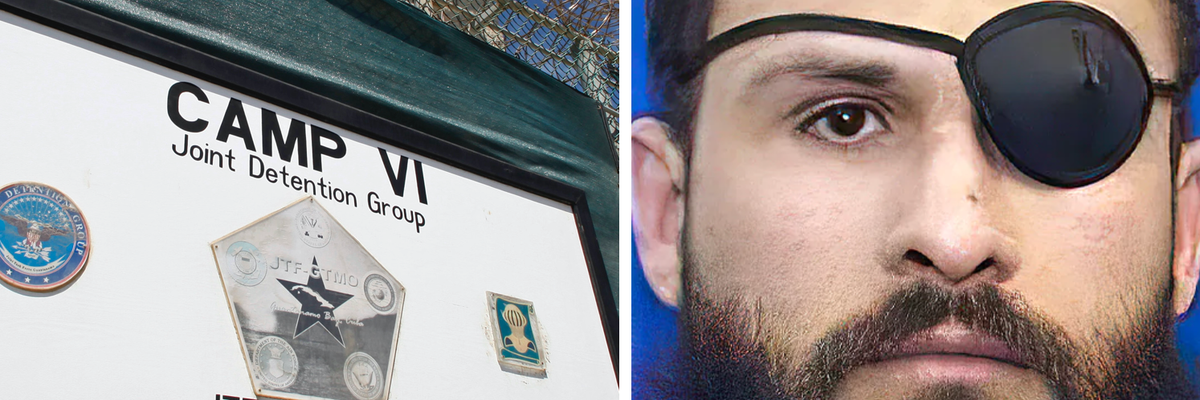The U.S. Supreme Court on Wednesday heard arguments from attorneys for Abu Zubaydah, a Guantanamo prisoner once mistakenly thought to be the third-ranking leader in al-Qaeda, about whether their client would be allowed to depose two CIA contract psychologists who devised and carried out the Agency’s torture program and participated personally in Abu Zubaydah’s torture.
Abu Zubaydah wants information from James Mitchell and Bruce Jessen about his time in a secret CIA prison, as well as information about the torture that Mitchell and Jessen subjected him to. A federal appeals court had earlier ruled in Abu Zubaydah’s favor, but the CIA appealed to the Supreme Court, saying that “national security” would be jeopardized if details of Abu Zubaydah’s torment were to be made public. That’s what they always say.
There’s a precedent for the testimony. First, much of the primary source information already has been declassified and released as part of the 2016 Senate Torture Report, one of the torturers had the gall to write a memoir, which he entitled, “Enhanced Interrogation: Inside the Minds and Motives of the Islamic Terrorists Trying to Destroy America.” Third, a group of CIA torture apologists, including former CIA Directors George Tenet, Michael Hayden, and Porter Goss, and former Deputy CIA Director John McLaughlin, published a book entitled, “Rebuttal: The CIA Responds to the Senate Intelligence Committee’s Study of Its Detention and Interrogation Program.” So much of the information is already public.
For the record, I led the raid that resulted in Abu Zubaydah’s capture on the night of March 22, 2002. I was serving as the CIA’s chief of counterterrorism operations in Pakistan, and those of us in the field were told that Abu Zubaydah had to be taken alive. He was supposed to have been a senior al-Qaeda operative, was “probably” involved in the 9/11 attacks, and constituted a “clear and present danger” to the United States. In the end, none of that turned out to be true.
Nonetheless, our mission was successful, and I sat with him for the first 56 hours of his captivity. He was severely wounded during the capture; a Pakistani policeman had shot him in the thigh, the groin, and the stomach with an AK-47. A CIA plane finally arrived to take him to a secret prison, one of several that he and at least a dozen other al-Qaeda suspects were taken to and in which they were tortured before eventually being dispatched to Guantanamo, where they have remained for more than 15 years.
We now know, thanks to the Senate Torture Report (or at least the report’s heavily redacted Executive Summary) that Abu Zubaydah underwent unspeakable torture. He was waterboarded 83 times, causing him at one point to literally drown. He had to be revived when his heart stopped. He was kept in a coffin-like box for 11 days which, after his torturers learned that he had an irrational fear of insects, he was forced to share with a boxful of cockroaches. He was subjected to sleep deprivation, freezing temperatures, solitary confinement, beatings, and was even threatened with having the bit of an electric drill forced into his brain.
One of the things that I noticed immediately upon Abu Zubaydah’s capture was that one of his eyes was a very pale blue, while the other was dark chestnut in color. It was clear that he was blind in the blue eye and that it had been injured traumatically. We learned later that shrapnel had damaged Abu Zubaydah’s eye during the Soviet occupation of Afghanistan, when he was fighting as one of the U.S.-backed “mujahedin.” The blind eye never bothered him. He certainly never complained about it. But one day, Abu Zubaydah was given a sedative and taken into surgery without him knowing what was even happening. A few hours later, he awoke and discovered that his eye had been removed without his knowledge or consent. There’s a legal definition for such an action. It’s called a “crime against humanity.”
Next March 22 will mark 20 years since Abu Zubaydah was taken into CIA custody. He has yet to be charged with a crime—any crime. He hasn’t even been able to question the people who tortured him. This is in what we like to think is the greatest country in the world, a shining beacon of respect for human rights.
I’m a strong believer in constitutional governance. I’m a believer in the rule of law. You don’t have to like Abu Zubaydah or his politics to acknowledge that he has a constitutional right to face his accusers in a court of law. He has a right to be judged by a jury of his peers. If he’s the bad guy that the CIA wants us to believe that he is, then why not charge him with a crime? Is it because the CIA tortured him mercilessly and has blown any chance that he can be justly prosecuted? Of course it is. Maybe that’s why, according to the Senate Torture Report, the CIA always intended to leave Abu Zubaydah in Guantanamo for the rest of his life, incinerate his body, and scatter his ashes into the ocean. That’s not justice. And it’s not the American way.
Meanwhile, now is indeed the time to do something with Abu Zubaydah. It’s time to release him. Even if he was the terrorist the CIA wanted us to believe he was, he has long since paid for his crimes. Twenty years of torture, 20 years of solitary confinement, 20 years of looking forward to nothing more than death to liberate him, and never having even been charged with a crime are enough. It’s time to right this wrong.
















